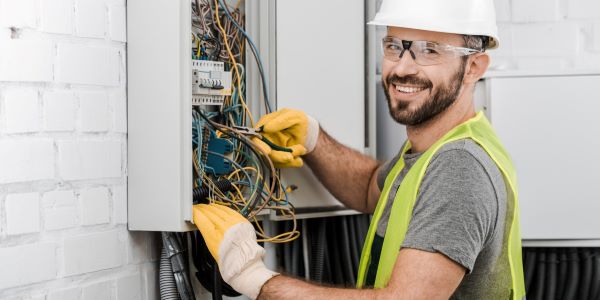Blog
How to Become an Electrician in Virginia

According to Salary.com, electricians in Virginia earn just over $54,000 a year on average, although the annual salary could be as high as about $70,000, depending on factors like location, experience, and additional skills or certifications.
In order to legally perform electrician services, professionals must first obtain a license issued by the Department of Professional and Occupational Regulation (DPOR).
There are several requirements, depending on the type of license you prefer. What are the different types of electrician licenses available in Virginia and how can you obtain them?
Types of Electrical Licenses
In Virginia, there are two main types of licenses available to electrical professionals: journeyman and master. What can you do with these licenses?
As a journeyman electrician, you may conduct activities like installing, repairing, and maintaining certain types of materials and equipment pertaining to the electrical field, but you must operate under the supervision of a master electrician.
As a master electrician, you can do everything a journeyman can, with the addition of performing activities like planning projects and laying out all the details. You can also operate independently and supervise journeyman electricians.
Additionally, you may decide to obtain an electrical contractor license to increase the scope of work available to you.
Journeyman Electrician
There are several options available to professionals interested in obtaining a journeyman electrician license, including:
- Completing a 2-year program offered by an approved trade school, technical school, or community college
- Completing 240 hours of education or vocational training plus 4 years of industry experience
- Completing 160 hours of education or vocational training plus 5 years of industry experience
- Completing 80 hours of education or vocational training plus 6 years of industry experience
- Completing 10 years of industry experience
Alternatively, you could earn a bachelor’s degree in an engineering program from an accredited college or university, paired with one year of industry experience. In all cases where trade experience is required, it must be verifiable in order to qualify. From there you must pass the Journeyman Electrical Exam to obtain a license.
Master Electrician
Once you have obtained a journeyman license, you can start working toward your master electrician license.
Before you can take the Master Electrical Exam, you must complete an additional year of practical experience as a licensed journeyman electrician in the state of Virginia. The only exception is if you have already amassed 10 years of industry experience.
Electrical Contractor License
You don’t necessarily need an electrical contractor license to operate as an electrician in Virginia, but if you want to bid on projects over $1,000 for a single contract, you must obtain this additional license. Requirements include passing the Master Electrical Exam and obtaining a contractor’s Class A, B, or C license.
Preparing for Examination
With the right electrician licensing and exam prep program, you have the best opportunity to pass the required testing the first time, so you can keep your career moving forward. If you’re ready to obtain your electrical license in Virginia, contact RocketCert today to find affordable and convenient courses that are right for you.
